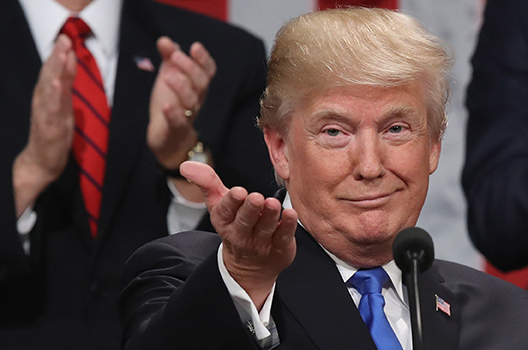US President Donald J. Trump will deliver his second State of the Union address to a joint session of Congress on February 5. US presidents often use State of the Unions to make their case for new legislative agendas and justify previous decisions.
While domestic issues such as immigration and a potential deal to avert another government shutdown will likely dominate the speech, foreign policy issues will also be addressed extensively, especially as Trump navigates new global crises and tries to position the United States in a new era of geopolitical competition. Here are the issue areas to watch as Trump addresses the nation:
What’s the next step in Venezuela?
The pressure has been building on Nicolás Maduro after the United States and dozens of other countries recognized Venezuelan National Assembly President Juan Guaidó as the interim president of the country. Guaidó took the oath of office as much of the official Venezuelan opposition and international observers refused to recognize the fraudulent election of Maduro for a second term last year.
The United States slapped further sanctions on Venezuelan oil on January 28 and Trump has previously said that “all options are on the table.” According to Atlantic Council Adrienne Arsht Latin America Center Director Jason Marczak, however, “there is a broad recognition from Latin American governments that the solution should not be a military one.”
Regional governments and relevant players within Venezuela will be listening closely to Trump’s speech for indications on how the US administration will approach the coming weeks and whether Washington continues to tighten the screws on the Maduro regime.
Will Trump double down on Syria withdrawal?
On December 19, the White House said: “We have started returning US troops home as we transition to the next phase of this campaign” in Syria.
The decision, which was based on a belief in the Trump administration that it has defeated ISIS, has been criticized by many policy makers for potentially leaving Syria too quickly without proper coordination with US allies. US Defense Secretary Jim Mattis resigned because he did not agree with the withdrawal decision.
On February 4, the US Senate passed an amendment blocking the Trump administration’s planned troop drawdowns in both Syria and Afghanistan by seventy to twenty-six, with only three Republican senators voting against the move.
As Trump addresses the opposing senators—and the US House which still must pass the amendment—he could use the opportunity presented by the State of the Union to either justify his plans or significantly walk them back.
Trade threats
One of the main foreign priorities for the Trump administration has been to renegotiate the trading relationship between the United States and both its competitors and allies. The US Congress still needs to approve the new US-Mexico-Canada Trade Agreement signed last November, so Trump will likely make a hard push in his speech for ratification.
Perhaps more importantly, markets will be watching closely for Trump’s statements on ongoing trade talks with both China and the European Union. Chinese officials were in Washington last week to attempt to resolve the ongoing trade war between both countries. Earlier in January, EU Commissioner for Trade Cecilia Malmström met with US Trade Representative Robert Lighthizer to make some progress on ongoing talks for a new free trade agreement, but the European Union still insists that agricultural goods are not on the table, despite the US desire to achieve tangible results in this sector.
Should Trump indicate that his patience is waning with regards to both or either of these negotiations, markets could sense that the threats of further tariffs are on the horizon.
Previewing the Trump-Kim meeting
Last month, Trump announced plans for a second meeting with North Korean leader Kim Jong-un to discuss denuclearization steps. This follows their June 12, 2018, meeting in Singapore.
Todd Rosenblum, a nonresident senior fellow at the Atlantic Council’s Scowcroft Center for Strategy and Security, warned that “another summit that is as light and salutatory to the chairman as last year’s will signal to China, Japan, North Korea, and South Korea that the American president is indifferent to anything more than imagery.”
Trump will likely not preview the specific agenda or goal for the meeting but could use the opportunity to reassure lawmakers about his engagement strategy with Pyongyang and make further appeals to Beijing to ramp up pressure on North Korea.
Will Trump endorse NATO?
It is unlikely that Trump will make any significant statements on Russia during his speech—if only to avoid the thorny situation of the ongoing investigation by Special Counsel Robert Mueller. Many in Congress and around Washington, however, would welcome an endorsement of the transatlantic alliance after a year in which the US president focused heavily on the issue of burden-sharing.
According to some reports, the president has raised the specter of leaving NATO or significantly downsizing the US role within it over his criticism of allies who are not spending on defense at the same level as the United States. Despite the rhetoric from the White House, both chambers in Congress have passed resolutions maintaining their full support for the Alliance, and on January 22 the House of Representatives passed a bill seeking to block a US president from being able to unilaterally withdraw the United States from the Alliance.
Will Trump continue his pointed criticism of NATO allies, or will he use the opportunity to re-affirm the United States’ solid commitment to the transatlantic alliance? We’ll find out tonight.
David A. Wemer is assistant director, editorial at the Atlantic Council. Follow him on Twitter @DavidAWemer.
Image: U.S. President Donald Trump delivers his first State of the Union address to a joint session of Congress inside the House Chamber on Capitol Hill in Washington, U.S., January 30, 2018. (REUTERS/Win McNamee/Pool)
